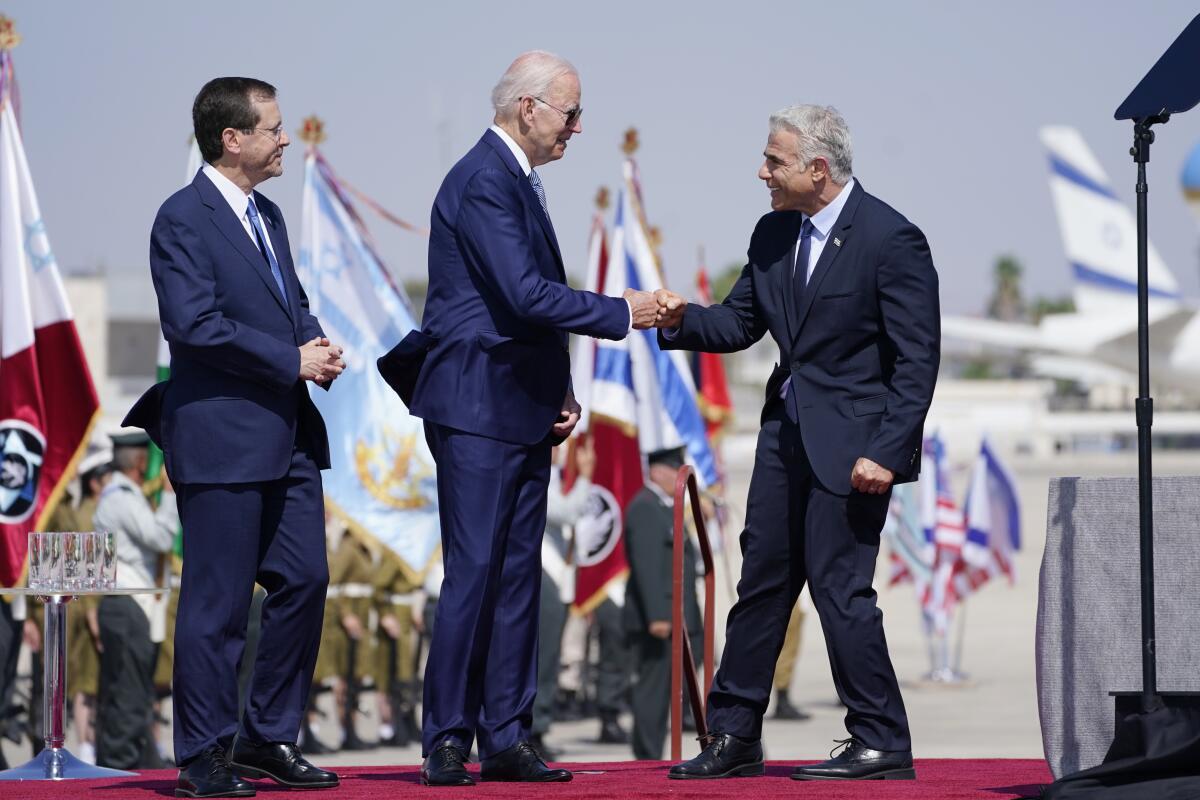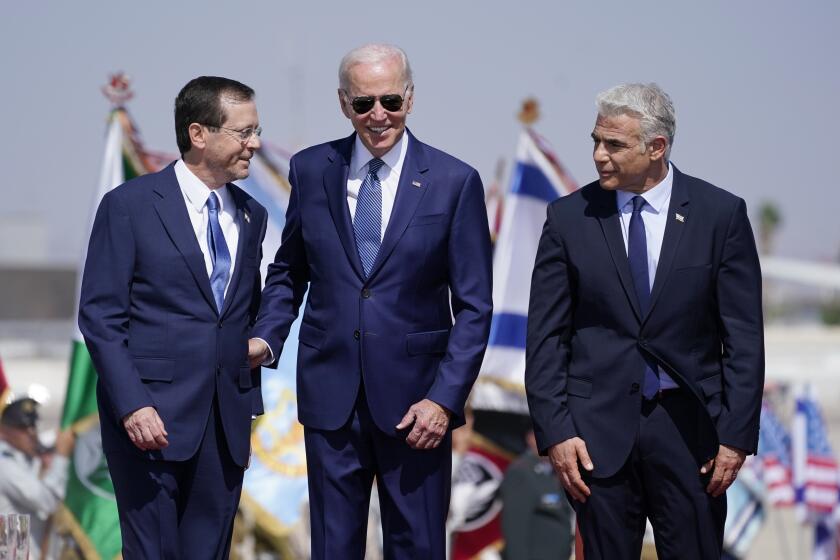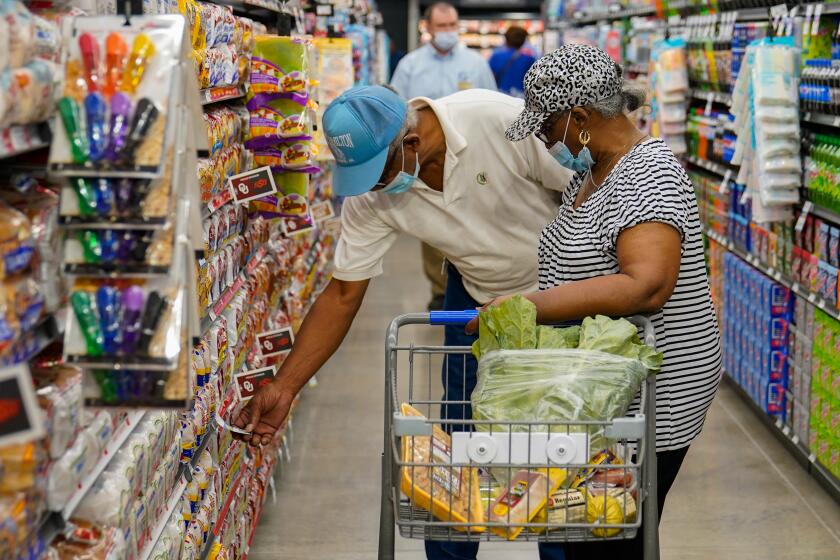News Analysis: Biden avoiding some hard topics over looming Saudi Arabia visit

- Share via
WASHINGTON — President Biden has boasted frequently about his own penchant for truth-telling, reminding the public about his promise to “give it to you straight.”
But in the run-up to a politically uncomfortable meeting this week with the Saudi crown prince believed to be responsible for the gruesome murder of a journalist, Biden and his top aides have been tying themselves in knots with euphemisms, elisions and even excuses to avoid politically uncomfortable truths.
Whereas President Trump was famous for saying “the quiet part out loud,” Biden’s unwillingness to utter the obvious — in this instance about his visit to Saudi Arabia — has only drawn more attention to the awkward inconsistencies he’s tried to obscure.
“I want to see how they are laying this visit out — will there be a photo of the meeting, will there be a joint press conference or joint statement afterwards? Will they, you know, sit down and have a meal?” said Marti Flacks, a former National Security Council and State Department official.
She noted that administration officials insisted Biden was going to Saudi Arabia to attend regional meetings. But the Saudis said they were looking forward to their bilateral, or one-one-one, meetings with the president.
“These optics really matter,” Flacks said, “in terms of the cards that the U.S. is playing.”
Biden’s hedging and reticence are not unique to his foreign policy. He has been publicly silent about negotiations over his domestic agenda since it blew up late last year. He has largely avoided addressing immigration issues, resisting aides who have encouraged him to deliver a speech on the subject, according to two administration officials with knowledge of internal conversations.
And he has seemed stuck on other decisions — whether it is easing Trump’s tariffs on China or forgiving federal student loan debt.
And then there is the trip to Saudi Arabia.
When the White House announced the trip, which began Wednesday with a stop in Israel, there was no explicit mention of any meeting with Saudi Crown Prince Mohammed bin Salman, known as MBS. Administration officials only begrudgingly acknowledged such a meeting was “likely” after being hit by a fusillade of questions from the media.
Pressed last month on whether the president stands by his comments during the 2020 campaign that the Saudis were a “rogue” regime and international “pariah,” Biden’s press secretary fought hard to avoid answering directly. Instead, she would only say that the president released the intelligence report concluding Mohammed was responsible for the brutal slaying of journalist Jamal Khashoggi in 2018, the implication being that the president agreed with the assessment.
“He said something he shouldn’t have said when he was running, and it’s making things very uncomfortable for him now,” said Ian Bremmer, the president of the Eurasia Group, a global risk assessment firm in New York. “The Saudis have problems, and Khashoggi is just one of them. But they’re an important ally and have actually made a lot of positive progress under MBS.”
For weeks, the president and aides have insisted that the visit to Saudi Arabia is not about oil, despite the global energy crunch resulting from Russia’s war in Ukraine. Rising inflation and high gas prices at home are a clear domestic political liability for Democrats who are facing dire midterm election forecasts.
In an op-ed published last week, Biden did not even list U.S. energy needs as a reason for his visit to the oil-rich kingdom. He cited the importance of normalizing ties between Arab nations and Israel, ending the war in Yemen, dealing with Iran, addressing climate change and developing “counterterrorism” strategies.
Biden also did not reference Khashoggi’s murder, only acknowledging “that there are many who disagree with my decision to travel to Saudi Arabia.” He added: “My views on human rights are clear and long-standing, and fundamental freedoms are always on the agenda when I travel abroad, as they will be during this trip.”
Khashoggi’s widow, who met with Biden at the White House before he departed, said Wednesday that the president had vowed to bring up the killing during his meeting with Mohammed. But during a news conference in Jerusalem on Thursday, Biden wouldn’t commit to doing so. “I will bring up human rights,” he said. “I always bring up human rights.”
One thing the White House is trying to avoid are photos of Biden embracing Mohammed.
On Wednesday just before Air Force One landed in Jerusalem, White House Press Secretary Karine Jean-Pierre told reporters that the president would be “minimizing contact” with foreign leaders on the trip because of rising COVID concerns, seemingly lowering expectations for a potential handshake with the crown prince.
That claim might have been somewhat believable given the rising caseloads from the new BA.5 variant — if only Biden hadn’t engaged in handshakes, back pats and hugs with Israeli leaders within minutes of landing in Tel Aviv. On Thursday, a senior administration official briefing reporters said Jean-Pierre’s comment was misinterpreted. “We never put out guidance that nobody would shake hands or anything else,” the official said.
“I wish they would be a little more plainspoken around it,” Bremmer said. “This all feels defensive and unnecessary. And at a time when the U.S. is struggling with such deeply eroded political institutions and the legitimacy of our own system and questions of values, we just need to be less in the practice of lecturing other countries around the world that we need cooperation from.”
The threat of Iran is bringing former adversaries together, but allies disagree sharply with President Biden over the solution.
The Saudis, after being coddled by Trump, haven’t made it easy on Biden, whose only conversations to date with Riyadh’s leaders have been with King Salman. The younger crown prince, who controls the Saudi government and is the country’s de facto leader, has avoided contact with Biden, apparently still angry over Biden’s criticisms during the campaign.
Biden’s top Middle East envoy, Brett McGurk, met privately with Mohammed for several hours earlier this year in Saudi Arabia as part of a diplomatic effort to defuse tensions, stabilize a critical bilateral relationship and clear a path for the crown prince and Biden to engage.
The prospect of Biden traveling to Saudi Arabia took on new urgency after Russian President Vladimir Putin’s Feb. 24 invasion of Ukraine. The attack led European countries to attempt to reduce their dependency on Russian oil and gas. Those actions and disruptions in global energy markets have led the price of oil to skyrocket.
The Saudis are the largest oil producer in OPEC+, a conglomerate of 23 countries that produce about 40% of the world’s crude. The kingdom has the greatest ability to increase output to calm markets and lower the cost of gasoline.
“It would actually help Biden domestically, given the political downside of meeting with MBS, to explain it and just say, ‘It is about oil and lowering your gas prices,’” said an administration official, granted anonymity to speak candidly about internal White House conversations. “But he doesn’t want to say that, maybe because there’s no guarantee from the Saudis that they’re going to help.”
Consumer prices soared 9.1% in June from a year earlier, the biggest yearly increase since 1981, and up from an 8.6% jump in May.
When the trip was announced last month, Biden told reporters it had been in the works before the war in Ukraine. That comment, the official said, took some White House national security staffers by surprise. Biden, the official added, had resisted numerous entreaties from aides urging him to meet with Mohammed, relenting only after the war began, further boosting gas prices.
Gregory Gause, a Saudi Arabia expert at Texas A&M University, said Biden’s trip to Saudi Arabia probably would not be taking place if not for the war.
“If there weren’t a crisis in Ukraine, oil prices might not have spiked as high as they did,” he said. “The president probably would have gone to the Middle East anyway, but I’m not sure that he would have added Saudi Arabia on to the itinerary.”
Biden’s decision to meet the Saudis on their turf, Gause said, is no small thing for the royal family, even if the White House has tried to obscure the point.
“This is the crown prince using this particular moment — when oil prices are high — and the leverage that Saudi Arabia has to get himself personally rehabilitated in a Democratic administration,” he said.
“That is really important for the Saudis. In exchange, the United States gets a return to a more normal kind of relationship with Saudi Arabia, where the president of the United States can call the leadership of Saudi Arabia and say, ‘Hey, you’ve got to help us out on oil questions.’”
Times staff writer Tracy Wilkinson contributed to this report.
More to Read
Get the L.A. Times Politics newsletter
Deeply reported insights into legislation, politics and policy from Sacramento, Washington and beyond. In your inbox three times per week.
You may occasionally receive promotional content from the Los Angeles Times.













